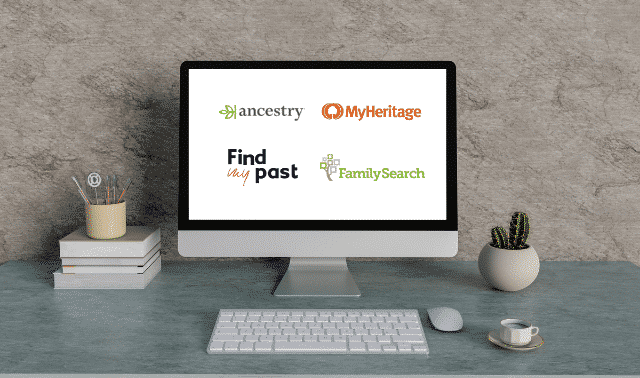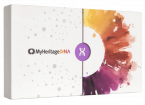Genealogy Sites - MyHeritage
![]()
Overview
MyHeritage was founded in 2003 by an Israeli software engineer Gild Japhet. He saw the demand for family tree services and developed one of the first computer-based family tree applications and the algorithms to support it.
Japhet has continued to serve as its CEO. For a long time the company’s headquarters were located in his family’s farmhouse at Bnei Atarot in Israel. Israel remains its base, although it has an office now in California.
The MyHeritage.com website was launched as an online family tree-building website in 2005. The company introduced its search engine for records in 2012 And MyHeritage turned profitable then for the first time. MyHeritageDNA came out in 2016. Today MyHeritage is the main commercial competitor to Ancestry.com.
In 2017 MyHeritage received a lot of negative press coverage when the company was hacked. No private data was compromised, but almost all of its customers were forced to change their passwords.
In 2021 MyHeritage was acquired by the San Francisco private equity firm Francisco Partners. The price for the acquisition was not disclosed, although it is thought to have been in the region of $600 million.
Genealogy Search

The MyHeritage website offers a large database of 10 billion records from various countries, including 3 billion records in Europe. In Europe they are particularly strong in records in Germany and Scandinavia and more recently in Austria and some of the Eastern European countries.
MyHeritage has some one million subscribers. The company is proud that it can communicate in 42 languages.
MyHeritage has their Family Tree Builder which allows you to build your own family tree on their site. Their smart matching technology will match you with hundreds of profiles in other family trees that they hold or have access to.
They have a free plan with limited features and a paid annual plan with more options. There are Premium, PremiumPlus, Data, and Complete subscription packages that allow different levels of access to their historical documents. Annual pricing ranges from $130 to $300.
How Does MyHeritage Compare as a Genealogy Site?
MyHeritage is the main commercial competitor to Ancestry, the industry leader, both as a genealogy site and for DNA-testing. Today MyHeritage’s genealogy site reports around one million subscribers, as against around three million for Ancestry. MyHeritage started out later, and from the different base of Israel and Europe rather than from America.
MyHeritage boasts the largest record database in Europe and it competes with Ancestry’s records database in the US. MyHeritage also has a stronger Jewish presence and has the largest collection of Jewish family trees.
DNA Testing

MyHeritage DNA, started in 2016, has 2.5 million users. Its test analyzes your DNA to determine the geographic and ethnic origins of your ancestors. The DNA test includes an ethnicity estimate (with a percentage breakdown of your ethnic origins), genetic groupings (i.e. geographic origins), and potential DNA matches.
Like AncestryDNA, MyHeritage has focused primarily on ethnicity results and less on the potential matches. But MyHeritage does have a chromosome browser to allow for auto-triangulation for those with shared DNA in order to search out a common ancestor.
Some users have been disappointed to find that you cannot use their DNA test to trace maternal and paternal family lines.
MyHeritage had initially expanded into health testing as well, but more recently seems to have flip-flopped on this. Apparently they prefer to focus solely on their ancestry test and are leaving health DNA analysis to other companies.
The MyHeritage DNA test costs $79.
How Does MyHeritage DNA Compare?
The MyHeritage DNA test kit goes with the cheek swab option to collect DNA samples, while AncestryDNA requires a saliva sample..
MyHeritage rivals AncestryDNA despite its lower user base. For American users, AncestryDNA will generally rank higher on its ethnicity results because of the greater detail it provides on origins and journey to America. And AncestryDNA does generate more potential matches, even if it has fewer tools for evaluating them. Both MyHeritage and AncestryDNA rely on autosomal testing only.
Three possible pluses for using MyHeritage are:
- their site is better targeted for European and Jewish users
- their test kit is usually cheaper that AncestryDNA’s
- and their response time in processing results is likely to be faster than AncestryDNA and other competitors.
Alternative Views
Some alternative views of MyHeritage DNA by Family History Fanatics is shown in this video.
And here is a range of comments raised by customers:
“What amazing customer service. My issue was dealt with and sorted in twenty-four hours. Truly remarkable service and I’d recommend this company with extreme confidence.”
“I bought a MyHeritage kit as a birthday present in February and paid for it then. To my absolute horror, I have just had £114 taken from my bank account for a subscription I did not agree to. I want this refunded immediately.”
“The data is very easy to follow and supports findings from other two tests. The ethnicity details are more refined than on Ancestry, with a lot of very specific data about European and Central American background. I’m impressed by the accuracy and even more impressed by a list of >2500 DNA matches by name and location. Various system tools allow you to identify relatives by country, ethnicity or closeness of match.”
“I found myself a little disappointed with the outcome. The ethnicity estimates felt very general compared to another DNA test I’d taken. For example, my results said I was nearly 76% North and West European. And that could include France, Germany, Belgium, Switzerland, Austria, the Netherlands and part of Denmark. While I know I have some relatives with German ancestry, with the broad-strokes results of this test, I felt like it didn’t tell me anything.”
Customer Rating: 82% (average of Trustpilot and Amazon ratings). MyHeritage ranks 1st of the 6 DNA-testing sites reviewed here.
.
Click here for return to front page

